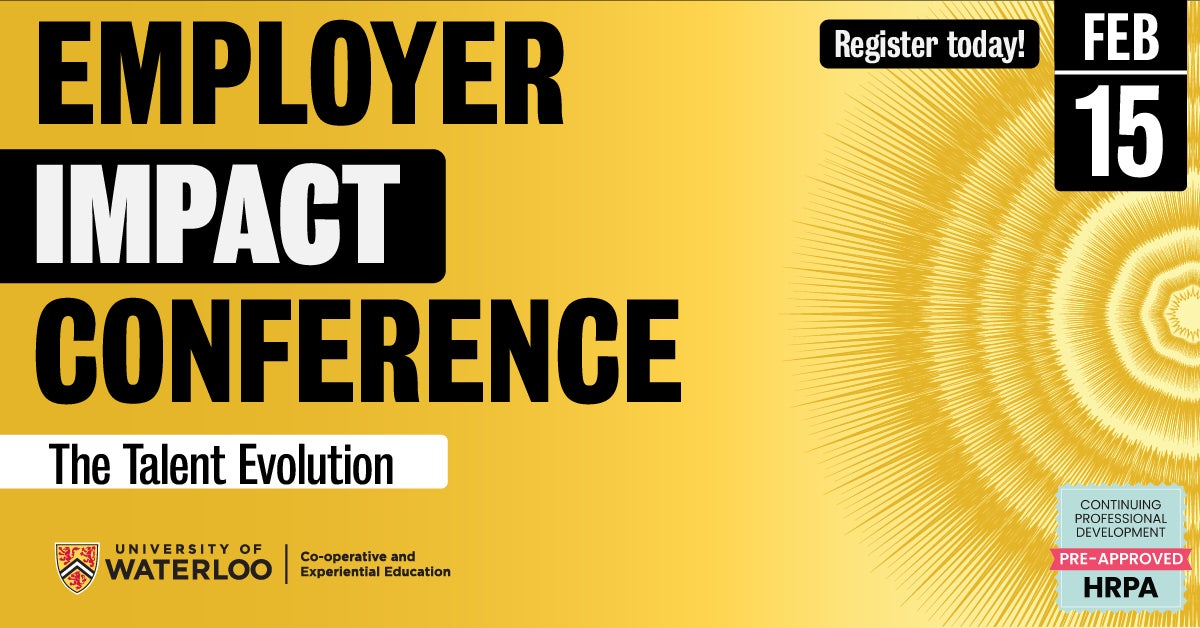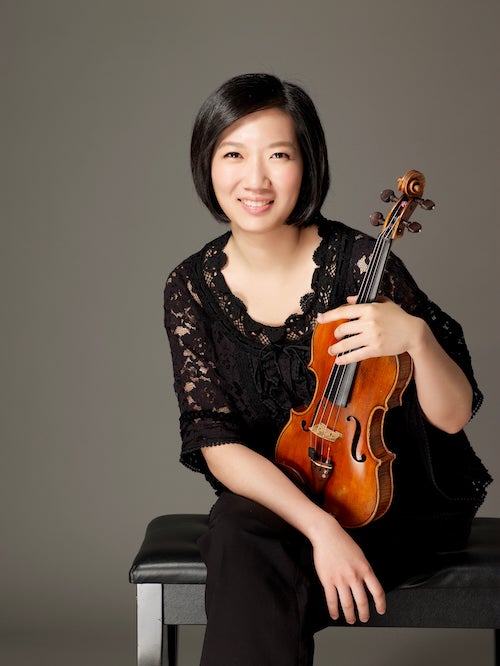- Introducing the 2023 Global Futures: Innovation Update
- University culture and the student mental health crisis
- Congratulations to the latest Graham Seed Fund recipients
- You don't want to miss the inaugural CEE Employer Impact Conference
- 'Your wall can(not) divide us' exhibit launches at Grebel Gallery
- 2023 Advisor Conference issues call for proposals; other notes
Editor:
Brandon Sweet
University Communications
bulletin@uwaterloo.ca
Introducing the 2023 Global Futures: Innovation Update

A message from Vivek Goel, President and Vice-Chancellor.
I am pleased to share with you the 2023 Global Futures: Innovation Update. Inside this publication you will find examples of Waterloo’s unconventional approach to developing future-focused solutions — built on boundary-breaking research, experiential education and entrepreneurship — that inspires innovation for real-world impact. Our faculty, students and alums are transforming societies, sustainability, health, technologies and economies for humanity to thrive in our complex future.
I invite you to read and share these inspiring stories and perspectives of our Waterloo community who are changing the world.
Read the full announcement from President Goel
University culture and the student mental health crisis

By Jon Parsons.

Something that is sorely missing in discussions of mental health and wellness on university campuses is an acknowledgement of the ways that university culture itself contributes to mental illness.
According to Dr. Maureen Drysdale, a professor of psychology at St. Jerome’s University and adjunct professor with the School of Public Health Sciences at the University of Waterloo, schools can inadvertently foster an environment that negatively impacts mental health.
“The university experience can at times be highly competitive,” Drysdale says. “Students may feel they do not measure up, and then also may feel it is not possible to seek help safely and efficiently. Universities try their best to provide resources or supports, but this doesn’t always hit the mark.”
Toxic positivity
One aspect of university culture that Drysdale points out is toxic positivity. The competitive academic environment can place enormous pressure on students to appear happy and effortlessly engaged all the time, regardless of any mental health struggles they are experiencing.
“Everyone’s going around with a smile, acting happy,” Drysdale says. “But that happiness can easily become toxic positivity, where students feel like they always have to be on. But underneath they’re just struggling, and they’re reluctant to open up.”
Toxic positivity can also, paradoxically, be reinforced by the promotion of wellness. Sometimes the promotion of mental health and wellness puts the onus on individuals to deal with things they have little control over, which can lead to a lot of self-blame and self-criticisms.
Hustle culture
Another aspect of university culture that Drysdale discusses as impacting student mental health is hustle culture. It can seem to students that it is not enough to simply get good grades, but that they must also launch entrepreneurial ventures, win big awards and constantly work to stand out.
“Students can feel like they always need to be productive,” Drysdale continues. “To get the best jobs, that CV or resume has to look near perfect, so there is a lot of pressure to always be doing more.”
At some schools, hustle culture is also highly competitive when it comes to work terms or rankings within programs, and so students can feel they are in a situation where they work against one another, rather than being part of a community.
Shifting culture and building peer support
Asked what might be done to help address the student mental health crisis, Drysdale says there needs to be a shift in academic culture. She acknowledges that can be a difficult task for universities, even as there is a genuine desire on the part of administrations to make things better.
“What we need is a culture where it’s okay to show your true self,” she says. “A lot of the stress is built up from the fact that students can’t appear imperfect or let down their guard. When we let down our guard, we look vulnerable. And if we look vulnerable, then maybe we don’t look happy and perfect all the time, and we question our right to be here. That’s a tough thing, but we need a university culture where it’s okay to be vulnerable and make mistakes.”
Drysdale also emphasizes the importance of peer support and sense of belonging as fundamental to any shift in academic culture, which she is working to build through her research and teaching. Drysdale runs the Well-Link Lab, housed at St. Jerome’s University, which is actively creating peer support capacity and wellness programs, along with researching student mental health.
Campus Wellness mental health resources
Congratulations to the latest Graham Seed Fund recipients

A message from the Office of Research.
This fall, the University of Waterloo’s Health Initiatives team launched the Graham Seed Fund (GSF) and invited researchers to submit their proposals for innovative health-care solutions. The GSF strengthens the University’s health system partnerships by providing resources for collaborating directly with a full range of health providers and clinicians.
“Waterloo researchers are transforming health-care, particularly in health technology. Collaborating with industry partners enables our researchers to innovate with purpose and bring solutions to the market for real-world impact,” says Dr. Catherine Burns, associate vice-president of Health Initiatives.
Ten research proposals have been selected from the 34 that were received. The recipient researchers span across five Waterloo faculties and the partnerships range from local hospitals and provincial health-care providers to industry partners and international universities and organizations.
Here are the ten recipient projects:
Acceptance and usability of the GuardIO, a mobile application to support care partners of persons living with dementia
- Lili Liu, Faculty of Health (Researcher)
- Alzheimer Society of Ontario, CareLective, Mohawk Council of Kahnawà:ke (Partners)
AI for identifying and addressing inequities in the health systems to improve patient outcomes
- Alexander Wong, Faculty of Engineering (Researcher)
- Grand River Hospital (Partner)
A new transdermal patch to continuously and without pain track and treat diabetes
- Mahla Poudineh, Faculty of Engineering (Researcher)
- Grand River Hospital, McMaster University, Google (Partners)
Clinical risk assessment tool for diabetic kidney disease in youth with type 2 diabetes
- Anita Layton, Faculty of Mathematics (Researcher)
- University of Toronto, University of Colorado, NorthShore University Health System (Partners)
Design of novel glaucoma stent
- Mihaela Vlasea, Faculty of Engineering (Researcher)
- St. Mary’s General Hospital, Grand River Hospital (Partners)
Development of a website for TB care linkages between the public and private sector providers in Nigeria
- Charity Oga-Omenka, Faculty of Health (Researcher)
- TB Public-Private Mix Learning Network, Institute of Human Virology, Nigeria (Partners)
Electronic-free, closed-loop soft robotic regenerative system for assisting people living with knee osteoarthritis
- Monica Maly, Faculty of Health (Researcher)
- Arthritis Society Canada (Partner)
Enhancing adherence to amblyopia treatment using social robotics
- Ben Thompson, Faculty of Science (Researcher)
- University of Waterloo Optometry Clinic (Partner)
Microrobotic chemolytic kidney stone removal
- Veronika Magdanz, Faculty of Engineering (Researcher)
- University Hospital Barcelona, University of Balearic Islands, Devicare (Partners)
Virtual psychotherapy for university students enhanced by natural language processing: A randomized pilot study of AI using the Get A-Head® software
- Dillon Browne, Faculty of Arts (Researcher)
- Sanctuary Refugee Health Centre, Family Psychology Centre Toronto, Children and Youth Planning Table Region of Waterloo (Partners)
The GSF is made possible by the J.W. Graham Trust Endowment Fund. Visit the Transformative Health Technologies website to learn more about the fund.
You don't want to miss the inaugural CEE Employer Impact Conference

A message from Co-operative and Experiential Education (CEE).
Are you looking for new ways to attract top co-op students? Do you want to learn more about how to build a sustainable talent strategy? Are you interested in leading insights about new roles of the future?
If you answered yes to any of these questions, then you'll want to register for Co-operative and Experiential Education's Employer Impact Conference on Wednesday, February 15, from 12 noon to 4:30 p.m.
A free, virtual event, the Employer Impact Conference will include:
- A keynote from philanthropist, business leader and co-op alumnus Michael Steele who will speak about the evolution of talent through social responsibility and global citizenship.
- Tips for utilizing WIL to build awareness of the United Nations' SDGs in your organization.
- A session about building awareness and capacity for an EDI-R and Indigenous relations.
- Research-informed best practices for onboarding next gen-talent.
Waterloo staff and faculty are welcome to attend the full conference or the sessions that work best with your schedule. Please share with employers, alumni or other contacts who may be interested.
Register for the Employer Impact Conference.
'Your wall can(not) divide us' exhibit launches at Grebel Gallery

A message from Conrad Grebel University College.
Join us this Wednesday from 7:00 p.m. to 8:00 p.m. to celebrate the latest Grebel Gallery exhibit. Curated by the International Consortium for Conflict Graffiti, the exhibit showcases thought provoking street art from five conflict zones and offers a chance to add your own graffiti to the civic dialogue.
Street art makes an important contribution to understanding local conflict-dynamics and visions of peace. Street art tells narratives about everyday concerns and opinions, where multiple and often contradicting narratives by different artists and communities can be publicly viewed. This holds value in situations of conflict and censorship, as art can talk about issues that have no space in the mainstream political discourse.
Street art can have a range of different functions – some are displayed in this collection. These functions can both contribute to peace and social change, but also to foster or underline conflict and division. Functions that can be seen in this exhibit include: resistance, political communication, identity expression, memorialisation of events or people, and inspiration.
2023 Advisor Conference issues call for proposals; other notes

The Advising Community of Practice invites you to submit a proposal to present at the 2023 Advisor Conference, a hybrid event taking place April 25-26, 2023. We hope you can share your advising best practices, theories, and/or approaches, or information about campus supports, services, and tools. Visit the Advisor Resources website to submit your conference session proposal by Friday, February 24. Explore previous conference sessions and resources on the Advisor Conference website – and keep an eye out for registration this March.

The next in Conrad Grebel University College's Noon Hour Concert Series takes place today at 12:30 p.m. The Virtuosic Violin, Bach, Waxman & More will feature Jung Tsai, the accomplished 2nd Associate Concertmaster of the KW Symphony, performing 20th Century violin works accompanied by pianist Anna Ronai. Franz Waxman’s virtuoso violin showpiece will be featured, entitled Carmen Fantasie. Other pieces include a work by eminent Canadian composer Elizabeth Raum, called Les Ombres.
Employers hosting Virtual Employer Information Sessions (VEIS) this week and next week include The Regional Municipality of Halton, Morningstar, FDM Group Canada Inc, Definity and The Regional Municipality of Halton - Engineering. Make sure to register through WaterlooWorks and check the calendar for any updates.
Here's today's Consent Week Tip of the Day provided by the Sexual Violence Prevention and Response Office (SVPRO):
When we think about consent, we often think about sexual consent, however, if we use consent in our everyday interactions, sexual consent will come more naturally.
Tip: Before touching someone in any way (e.g. a hug, picking a fuzzy off their shirt, pushing their wheelchair) ask for consent (e.g. It looks like you may want a hug? You have a fuzzy on your shirt, would you like me to pick it off? Would you like me to push?)
Campuses closed at 5:00 p.m. today
A late-breaking update: All UWaterloo campus locations will close today at 5 p.m. due to severe weather conditions. As a result, all in-person classes, labs and tutorials scheduled 5pm onward will not run. Online classes will run as expected.
Please monitor our weather statement page for further details.
Link of the day
When and Where to get support
Students can visit the Student Success Office online for supports including academic development, international student resources, immigration consulting, leadership development, exchange and study abroad, and opportunities to get involved.
Instructors looking for targeted support for developing online components for blended learning courses, transitioning remote to fully online courses, revising current online courses, and more please visit Agile Development | Centre for Extended Learning | University of Waterloo (uwaterloo.ca).
Faculty, staff, post-doc and graduate student instructors can find upcoming teaching and learning workshops, self-directed modules and recordings of previous events on Centre for Teaching Excellence Workshops and Events page.
Instructors can access the EdTech Hub to find support on Waterloo’s centrally supported EdTech tools. The Hub is supported by members of IST’s Instructional Technologies and Media Services, Centre for Teaching Excellence, Centre for Extended Learning and subject matter experts from other campus areas.
Supports are available for employees returning to campus. Visit IST’s Hybrid Work and Technology guidelines and workplace protocols to assist with the transition.
Students with permanent, temporary and suspected disabilities and disabling conditions (medical conditions, injuries, or trauma from discrimination, violence, or oppression) can register with AccessAbility Services for academic accommodations (classroom accommodations, testing accommodations, milestone accommodations).
Instructors can visit AccessAbility Services' Faculty and Staff web page for information about the Instructor/Faculty role in the accommodation process. Instructors/Faculty members are legally required to accommodate students with disabilities. AccessAbility Services (AAS) is here to help you understand your obligations, and to offer services and resources to help you facilitate accommodations.
The Writing and Communication Centre has in-person and virtual services to support grad and undergrad students, postdocs and faculty with any writing or communication project. Services include one-to-one appointments, drop-ins at Dana Porter Library, online workshops, writing groups, English conversation practice, and custom in-class workshops.
Research Ethics: Find yourself with an ethical question, unsure if your work requires an ethics review, or need advice about putting together a research ethics application? Reach out to one of our friendly staff by booking a consultation or email us with your questions.
Co-op students can get help finding a job and find supports to successfully work remotely, develop new skills, access wellness and career information, and contact a co-op or career advisor.
The Centre for Career Action (CCA) has services and programs to support undergrads, grad students, postdocs, alumni, and employees in figuring out what they value, what they’re good at, and how to access meaningful work, co-op, volunteer, or graduate/professional school opportunities. Questions about CCA's services? Live chat, call 519-888-4047, or stop by our front desk in the Tatham Centre 8:30 a.m. to 4:30 p.m., Monday to Friday.
Drop-in to in-person Warrior Study Halls on Thursdays from 5:00 p.m. to 6:30 p.m. in DC and DP. Join a Peer Success Coach to set goals and work independently or in groups each week.
Renison's English Language Institute continues to offer virtual events and workshops to help students practice their English language skills.
If you feel overwhelmed or anxious and need to talk to somebody, please contact the University’s Campus Wellness services, either Health Services or Counselling Services. You can also contact the University's Centre for Mental Health Research and Treatment. Good2Talk is a post-secondary student helpline available to all students.
The Library is here to help, both in person and online. Our spaces are open for access to book stacks, study space, computers and printers, and the IST Help Desk. For in-depth support, meet one-to-one with Librarians, Special Collections & Archives and Geospatial Centre staff. Access our resources online for anywhere, anytime learning and research. Full details on current services and hours are available on the Library’s COVID-19 Update webpage.
The Faculty Association of the University of Waterloo (FAUW) continues to advocate for its members. Check out the FAUW blog for more information.
The University of Waterloo Staff Association (UWSA) continues to advocate for its members. Check out the UWSA blog for more information.
The Office of Equity, Diversity, Inclusion & Anti-Racism (EDI-R) works with students, faculty and staff across campus to advance equity and Anti-racism through evidence-based policies, practices and programs. If you have a concern related to Anti-racism and/or equity, please complete our intake form.
The Sexual Violence Prevention and Response Office (SVPRO) supports all members of the University of Waterloo campus community who have experienced, or been impacted, by sexual violence. This includes all students, staff, faculty and visitors on the main campus, the satellite campuses, and at the affiliated and federated Waterloo Institutes and Colleges. For support, email: svpro@uwaterloo.ca or visit the SVPRO website.
The Office of Indigenous Relations is a central hub that provides guidance, support, and resources to all Indigenous and non-Indigenous campus community members and oversees the University's Indigenization strategy.
The Waterloo Indigenous Student Centre, based at United College, provides support and resources for Indigenous students, and educational outreach programs for the broader community, including lectures, and events.
WUSA supports for students:
Peer support - MATES, Glow Centre, RAISE, Women’s Centre - Click on one of the links to book an appointment either in person or online for the term.
Food Support Service food hampers are currently available from the Turnkey Desk 24/7 in the Student Life Centre. Drop-off locations are also open again in SLC, DC, DP, SCH, and all residences.
Co-op Connection all available online.
Centre for Academic Policy Support - CAPS is here to assist Waterloo undergraduates throughout their experience in navigating academic policy in the instances of filing petitions, grievances and appeals. Please contact them at caps@wusa.ca.
WUSA Student Legal Protection Program - Seeking legal counsel can be intimidating, especially if it’s your first time facing a legal issue. The legal assistance helpline provides quick access to legal advice in any area of law, including criminal. Just call 1-833-202-4571.
Empower Me is a confidential mental health and wellness service that connects students with qualified counsellors 24/7. They can be reached at 1-833-628-5589.
GSA-UW supports for graduate students:
The Graduate Student Association (GSA-UW) supports students’ academic and social experience and promotes their well-being.
Advising and Support - The GSA advises graduate students experiencing challenges and can help with navigating university policies & filing a grievance, appeal, or petition.
Mental Health covered by the Health Plan - The GSA Health Plan now has an 80 per cent coverage rate (up to $800/year) for Mental Health Practitioners. Your plan includes coverage for psychologists, registered social workers, psychotherapists, and clinical counselors.
Dental Care - The GSA Dental Plan covers 60 to 70 per cent of your dental costs and by visiting dental professionals who are members of the Studentcare Networks, you can receive an additional 20 to 30 per cent coverage.
Student Legal Protection Program - Your GSA fees give you access to unlimited legal advice, accessible via a toll-free helpline: +1-833-202-4571. This advice covers topics including housing disputes, employment disputes, and disputes with an academic institution.
The Graduate House: Open Monday to Tuesday 11:30 a.m. to 7:00 p.m. and Wednesday to Friday 11:30 a.m. to 9:00 p.m. We’re open to all students, faculty, staff, and community members. The Graduate House is a community space run by the GSA-UW. We’re adding new items to the menu. Graduate students who paid their fees can get discounts and free coffee.
When and Where
Warriors Game Day Tickets and Season Passes, on sale now. Cheer on your Warriors W/M Basketball, Football W/M Hockey and W/M Volleyball teams at home during the 2022-23 season. Purchase today.
Fitness and Personal Training - Registrations opened January 5 this winter with Personal Training and Small Group Training as well as a Free Warrior Workout Program.
Student Health Pharmacy in the basement of the Student Life Centre is now offering Covid booster shots (Pfizer and Moderna) and flu shots. Call 519-746-4500 or extension 33784 for an appointment. Walk-ins always welcome.
Waterloo Womxn + Nonbinary Wednesdays: Goal-setting & Planning Tools workshop, Wednesday, January 25, 12:00 p.m., online.
Noon Hour Concert: The Virtuosic Violin, Bach, Waxman & More, Wednesday, January 25, 12:30 p.m. to 1:30 p.m., Conrad Grebel Chapel.
Faculty workshop: Navigating your first probationary term, Thursday, January 26, 1:00 p.m., online.
Researching Like A Pro, Thursday, January 26, 4:00 p.m. to 5:00 p.m., SCH second floor 228. Pizza and water provided. Registration.
Lectures in Catholic Experience featuring Fr. Toby Collins, CR, "Tiny Resurrections for Today," Thursday, January 26, 7:30 p.m., Notre Dame Chapel.
Deadline to register for Centre for Extended Learning (CEL) "Getting Ready to Facilitate Online Courses: TA Training – Winter 2023" course, Monday, January 30.
2SLGBTQ+ Fundamentals, Tuesday, January 31, 10:00 a.m. to 12 noon, online.
Positions available
On this week's list from the human resources department, viewable on the UWaterloo Talent Acquisition System (iCIMS):
- Job ID# 2023-9846 - Systems Integration Specialist - Information Systems & Technology, USG 11 – 12
- Job ID# 2023-9822 – Groundsperson - Plant Operations, CUPE
- Job ID# 2023-9824 - Supervisor, HVAC & Controls - Plant Operations, USG 10 – 12
- Job ID# 2023-9801 - Graduate Studies Manager - Statistics & Actuarial Science, USG 8
- Job ID# 2022-9197 - Operations Manager - Centre for Education in Mathematics and Computing, USG 8
- Job ID# 2023-9799 - Advancement Coordinator, Science Advancement - Dean of Science, USG 6
- Job ID# 2023-9816 - Senior Development Officer, Science - Dean of Science Office, USG 10 – 11
- Job ID# 2023-9820 - Administrative Coordinator & Advisor, U/G Studies - Political Science, USG 6
- Job ID# 2023-9812 - Circulation Service Desk Coordinator – Library, USG 6
- Job ID# 2023-9808 - Information Technology Specialist (ITS) - Business Analyst and Consultant - Arts Computing Office (ACO), USG 13
- Job ID# 2022-9721 - Manager, Events and Engagement – WatSPEED, USG 11
- Job ID# 2023-9840 - Performance Measurement Analyst - School of Accounting and Finance, USG 10
- Job ID# 2023-9831 - Analytical Lab Services Specialist - Chemical Engineering, USG 10
- Job ID# 2023-9814 - Institutional Analyst - Institutional Analysis & Planning, USG 8 – 13
- Job ID# 2023-9845 - Project Manager - CEE - Centre for Work-Integrated Learning, USG 10
- Job ID# 2023-9810 - Student Advisor - East Region - CEE - Co-operative Education, USG 8 – 9
Secondments/Internal temporary opportunities
- Job ID# 2023-9804 - Inquiry Management Assistant - Campus Housing, USG 4
- Job ID# 2023-9777 - Administrative Coordinator - Electrical and Computer Engineering, USG 5
- Job ID# 2023-9811 - Graduate Admissions Administrator - Electrical and Computer Engineering, USG 6
- Job ID# 2023-9782 - Project Manager - Plant Operations, USG 9 – 12
- Job ID# 2023-9842 - Information Systems Specialist (Learning Environment Specialist) – IST, USG 10 – 11
- Job ID# 2023-9847 - Senior Equity Training Specialist - Equity, Diversity, Anti-Racism, Inclusion Office, USG 10
- Job ID# 2023-9769 - Brand and Communications Specialist – WatSPEED, USG 10
- Job ID# 2022-9084 - Business Development Manager - Cybersecurity and Privacy Institute, USG 10
- Job ID# 2023-9841 - Institutional Analyst - Institutional Analysis & Planning, USG 9 – 11
- Job ID# 2023-9830 - Events and Communications Specialist - Graduate Studies and Postdoctoral Affairs, USG 6
- Job ID# 2023-9786 - Manager, Graduate and Postdoctoral Programs - Institute for Quantum Computing, USG 7
- Job ID# 2023-9818 - Research Associate - CEE - Work-Learn Institute, USG 8 – 10
- Job ID# 2023-9807 - Senior Development Officer - Central Development, USG 10 – 11
- Job ID# 2023-9828 - Student Advisor (Central West Region) - CEE - Co-operative Education, USG 8 - 9
Affiliated and Federated Institutions of Waterloo opportunities